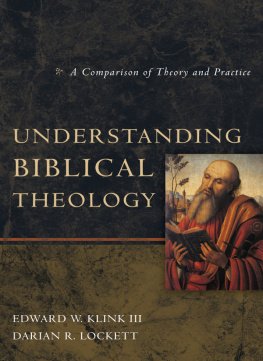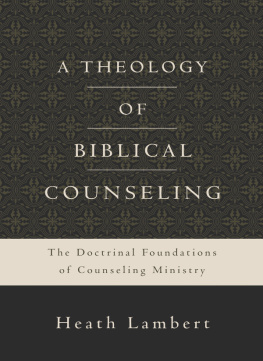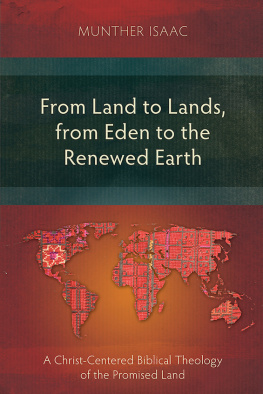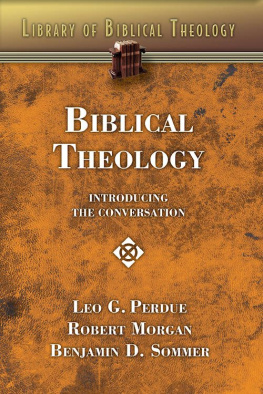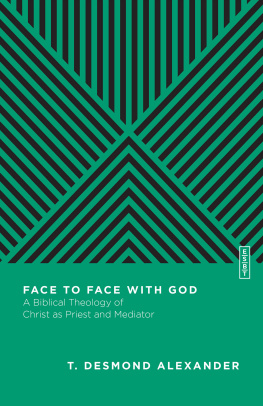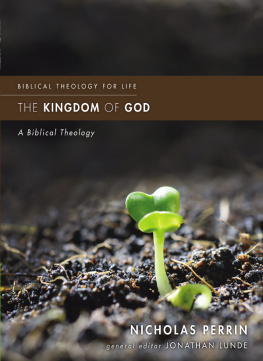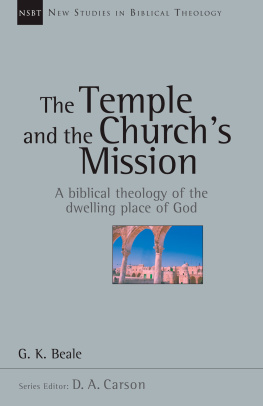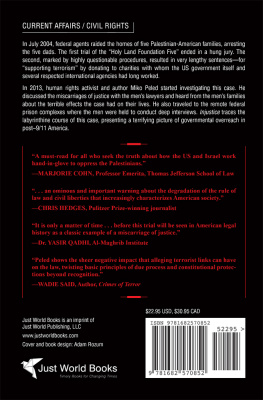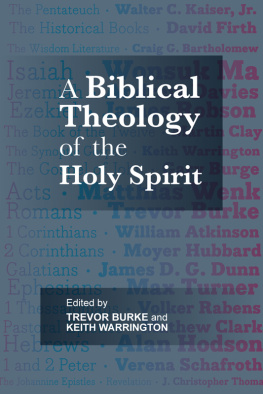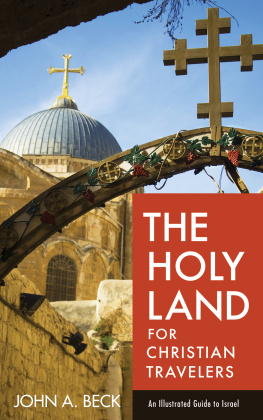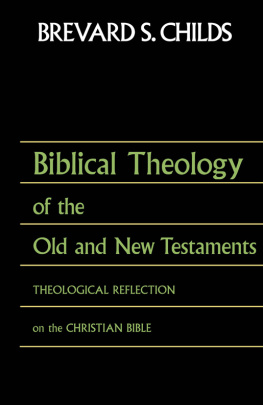Brelo - God Dwelling with His Children in Paradise: A Biblical Theology of the Holy Land
Here you can read online Brelo - God Dwelling with His Children in Paradise: A Biblical Theology of the Holy Land full text of the book (entire story) in english for free. Download pdf and epub, get meaning, cover and reviews about this ebook. year: 2012, genre: Religion. Description of the work, (preface) as well as reviews are available. Best literature library LitArk.com created for fans of good reading and offers a wide selection of genres:
Romance novel
Science fiction
Adventure
Detective
Science
History
Home and family
Prose
Art
Politics
Computer
Non-fiction
Religion
Business
Children
Humor
Choose a favorite category and find really read worthwhile books. Enjoy immersion in the world of imagination, feel the emotions of the characters or learn something new for yourself, make an fascinating discovery.

God Dwelling with His Children in Paradise: A Biblical Theology of the Holy Land: summary, description and annotation
We offer to read an annotation, description, summary or preface (depends on what the author of the book "God Dwelling with His Children in Paradise: A Biblical Theology of the Holy Land" wrote himself). If you haven't found the necessary information about the book — write in the comments, we will try to find it.
Brelo: author's other books
Who wrote God Dwelling with His Children in Paradise: A Biblical Theology of the Holy Land? Find out the surname, the name of the author of the book and a list of all author's works by series.
God Dwelling with His Children in Paradise: A Biblical Theology of the Holy Land — read online for free the complete book (whole text) full work
Below is the text of the book, divided by pages. System saving the place of the last page read, allows you to conveniently read the book "God Dwelling with His Children in Paradise: A Biblical Theology of the Holy Land" online for free, without having to search again every time where you left off. Put a bookmark, and you can go to the page where you finished reading at any time.
Font size:
Interval:
Bookmark:
GODDWELLING WITH HIS CHILDREN IN PARADISE:
A BIBLICAL THEOLOGY OF THE HOLY LAND
By Sam Brelo
Copyright 2012 by Samuel L. Brelo
All rights reserved
CONTENTS
PREFACE AND ACKNOWLEDGMENTS
INTRODUCTION
Chapter 1 - The Foundation: TheFive Books of Moses
Chapter 2 - The Old TestamentHistorical and Poetic Books
Chapter 3- The Old Testament Prophetic Books
Chapter 4 - The Holy Land in theGospels
Chapter 5 - The Book of Acts
Chapter 6 - Letters of Paul andOthers
Chapter 7 - The Books of Hebrewsand the Revelation
CONCLUSION
IMPLICATIONS
PREFACE AND AGKNOWLEDGEMENTS
This book is an adaptation of one of the chapters in mydissertation for my Doctor of Ministry. My doctoral project involved thedevelopment of a seminar on a biblical theology of the Holy Land that waspresented to a number of pastors in 2011. This present volume is an effort tomake available the essential contents of the seminar to a wider audience by wayof a book.
My interest in a theological understanding of the Holy Landbegan in the 1980s when I was preparing to move with my family to the MiddleEast to do missionary work among Palestinian Arabs. Although I studied varioustopics connected to a theological understanding of the Holy Land through theyears, I did not develop an over-arching biblical theology of the Holy Landuntil working on my doctorate in 2010/11. I traced the concept of the Holy Landand its function in the plan of God from Genesis through Revelation and thenendeavored to describe the major ideas that I found. This present book is thefruit of that labor.
This book has been very rewarding for me personally.Tracing a concept through the entire Bible and seeing how it unfolds is veryenlightening and is the essence of doing biblical theology. I owe much of thisemphasis in my personal studies to Dr. Doug Oss, a professor at the seminarywhere I attended.
I deeply thank my wife for her prayers and encouragement during myentire studies on this important subject. She is truly a great blessing in mylife. It is to her that this book is dedicated.
Most of all, I thank Jesus, the Messiah, who has made me a son ofGod and through whom and with whom I will live in the true Holy Land, forever.
Thesubject of the Holy Land is a topic of discussion investigated by biblicalscholars, politicians, historians, sociologists, and others. This book willexplore the topic of the Holy Land from a biblical perspective drawing from theOld Testament and the New Testament and offering a brief summary of thebiblical record. Only a biblical-theological approach to the Holy Land willgive a correct and authoritative understanding of this important subject. Thepurpose of this study is to provide such an understanding.
An importantpresupposition in this book is that all sixty-six books of the Bible aredivinely inspired and without error. Divine inspiration means that God is theultimate author of Scripture; therefore, there should be an overall unitythroughout the Bible as well as an unfolding of revelation through time.Because Jesus is the Word of God and all the promises of God find their Yes inhim (2 Cor. 1:20), the clearest andmost authoritative way to understand the Old Testament is through Jesus and theNew Testament apostles and prophets as recorded in the New Testament. This isnot because of greater inspiration, but because the unfolding revelationbecomes clearer as salvation history unfolds through time and is brought intothe clearest focus through the Christ event. Longago, at many times and in many ways, God spoke to our fathers bythe prophets, but in these last days he has spokento us by his Son... (Heb. 1:1-2a).
The Holy Land isfirst alluded to in Genesis 12:1.From this point, all of biblical history recorded in the Old Testament (withthe possible exception of the book of Esther), is tied in some way to thisland. Because of this, it is difficult to overestimate the importance of theHoly Land in the Old Testament. However, Genesis 12:1 is not the first place inthe Pentateuch (the five Books of Moses) that the concept of holy land isseen. Actually, Gods promise to Abraham of a land must be understood in thecontext of the Creation account and the first eleven chapters of Genesis.
After God createdthe heavens and the earth in six days,and as His son (Luke 3:38) to be both creature and ruler.
After everythingwas created and set in place, God pronounced it very good (Gen. 1:31). Thissignaled the end of Gods creative work and the beginning of His rule overcreation through humankind. Upon reaching this point, God rested on the seventhdayHe set it apart (making it holy), and blessed it. In the Ancient Near East,kings
would often build palaces of rest,especially after victory in conflict and the establishment of their kingdoms.
This picture ofthe Garden of Eden being Gods sanctuary of rest sheds further light on Adambeing in the image of God. Ancient kings would often build a temple for theirgods and then put an image of the god in the temple.
God placed His sonAdam (Luke 3:38) in the symbol of His sovereign rule and restthe Garden ofEdento work it and keep it (Gen. 2:15). The Hebrew words for work andkeep are abad and shamar, respectively. They are individuallyused many times in the Old Testament. Many times in the Pentateuch abadis used in connection with service in the tabernacle (Num. 4:23-24, 26, 30, 37,41, 47; 7:5; 8:11, 15, 19, 22; 16:9; 18:6, 7, 21, 23). When abad iscoupled with shamar (as in Gen. 2:15), the context is either the serviceof the tabernacle (Num. 3:7-8; 8:26; 18:7) or loyalty to God by Israel (Deut.11:16; 12:30; 13:4). It is highly likely that the words abad and shamar,coupled together in Genesis 2:15, depict Adam as a priest in Eden to faithfullyserve God. The context of Genesis chapters 1 and 2, then, portrays Adam as botha king and a priest to serve God in His templethe Garden of Eden.
Adam, as Godsson, lived in Eden and therefore enjoyed the rest of God, symbolizing Godssovereign rule. This rest of God that Adam enjoyed was not only real; it wasalso anticipatory of a larger, universal rest. The command to multiply, andsubdue the earth (Gen. 1:28), was to extend Gods rule and Gods rest to all ofcreation. Gods garden sanctuary was to be extended to the entire world wherehumankind and Creation would enjoy the glorious presence of God. Davidreflected on this purpose later in Psalm 8 when he wrote: Gods name ismajestic in all the earth (vv. 1, 9) and God has crowned man with glory andhonor (v. 5).
As Gods priest inHis temple, Adam was to serve God and protect the sanctity of Gods gardentemple. Adam failed to do this, not only by his own disobedience to Godscommand, but also by tolerating the unclean serpent over which he had authority(Gen. 1:28) in the Garden. Adam, therefore, abrogated his kingly and priestlyministry. Not only did Adam and Eve not extend the boundaries of the Garden ofEden, they were barred from the Garden itself by the cherubim of God (3:24). Infact, the text states in Genesis 3:24 that the Lord God drove out Adam fromthe Garden of Eden. The expression drove out (Heb. garash) is oftenused in the Pentateuch in connection with Israel driving out the inhabitants ofCanaan.The important point of this story is that Adam and Eve lost the original holyland or Gods temple. By this occurrence, they lost the rest of God and theirown inheritance as Gods children.
The entire storyand goal of the Bible is that humankind might experience the fullness for whichhe was created, all to the glory of God. This means the return of humankind toGods rest, to live in His temple, and experience his sonship to God as aking-priest. This will ultimately be seen in the book of Revelation.
Font size:
Interval:
Bookmark:
Similar books «God Dwelling with His Children in Paradise: A Biblical Theology of the Holy Land»
Look at similar books to God Dwelling with His Children in Paradise: A Biblical Theology of the Holy Land. We have selected literature similar in name and meaning in the hope of providing readers with more options to find new, interesting, not yet read works.
Discussion, reviews of the book God Dwelling with His Children in Paradise: A Biblical Theology of the Holy Land and just readers' own opinions. Leave your comments, write what you think about the work, its meaning or the main characters. Specify what exactly you liked and what you didn't like, and why you think so.

